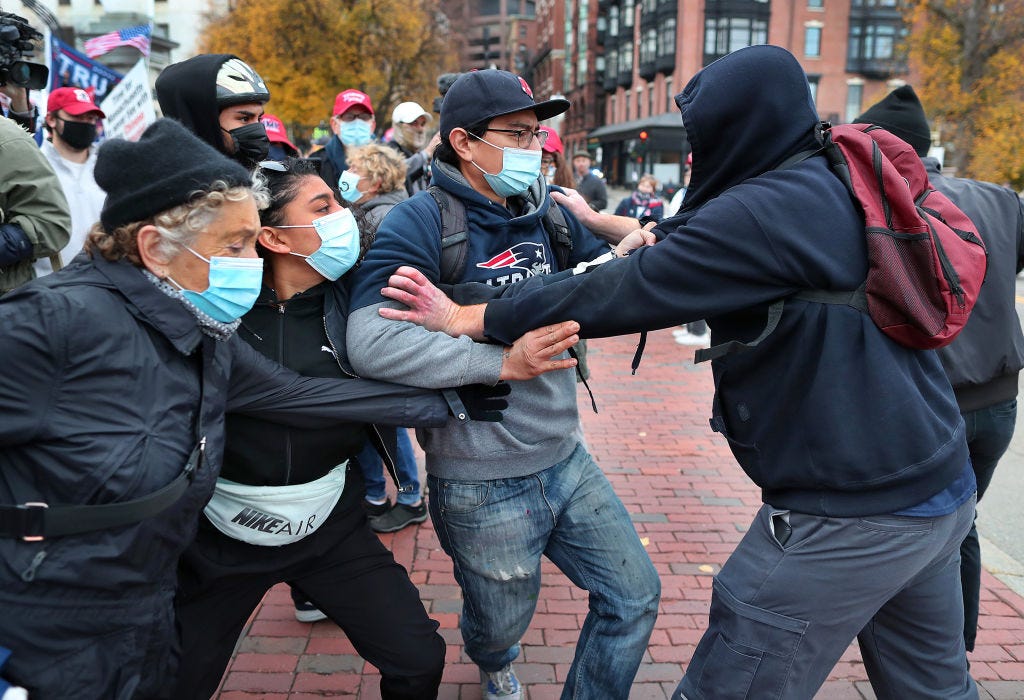What 2020 Meant
The summer of five years ago can help us explain—and overcome—America’s present.

During a joint session of Congress in March, President Trump declared: “Our country will be woke no longer.” The Trump administration has dismantled DEI across the federal government, pressured companies to do the same, slashed billions of dollars in university funding (ostensibly in response to antisemitism on campus, but also to impose political control and root out “critical race theory” and “gender ideology”), and kicked transgender soldiers out of the military. Administration officials have even justified the elimination of foreign aid on the basis that this aid sometimes goes toward what they regard as “woke” causes.
In many ways, this anti-woke crusade is already out of date. If we define “wokeness” as a reductive, censorious, and authoritarian form of identity politics purporting to be a movement for “social justice,” this phenomenon has been in retreat for a long time. Even Christopher Rufo, perhaps the most prominent conservative activist today and a major architect of the Trump administration’s assault on American universities, recently observed that we’re well past “peak woke.”
For a vivid reminder of how dramatically the zeitgeist has shifted, look no further than Thomas Chatterton Williams’s illuminating new book Summer of Our Discontent: The Age of Certainty and the Demise of Discourse. Williams explores how the “season of rebellion and reckoning” after the death of George Floyd at the hands of Minneapolis police officer Derek Chauvin in May 2020 was the climax of an undeniably illiberal moment in the United States. A combustible mix of factors—the final year of Trump’s first term, COVID-19 lockdowns, and simmering racial resentment that had been building for years—triggered a period of social and political upheaval over race and identity unlike anything the United States had experienced in decades.
Williams chronicles several of the most egregious examples of identitarian excess in the wake of the Floyd killing. There was the firing of New York Times opinion editor James Bennet after a staff revolt in response to the publication of an op-ed by Arkansas Senator Tom Cotton which called for the deployment of the military to quell riots around the country. There were the largely white protesters in Portland “cosplaying as Antifa militants” who “besieged and ransacked the city’s downtown area around the Multnomah County Justice Center.” There was the sudden blossoming of the “antiracism” industry, in which authors like Robin DiAngelo and Ibram X. Kendi taught millions of readers and thousands of corporate seminar attendees to wage an obsessive internal struggle against their own ineradicable racism and prejudice. There were the endless heresy hunts, defenestrations, pressure campaigns, and capitulations from universities, companies, and elite institutions across the country.
Williams, most notably in a New York Times review of Summer of Our Discontent, has been attacked for directing too much of his ire toward left-wing rather than right-wing illiberalism. But the author of that review may as well have asked him to write a different book. A central theme is Williams’s argument that an “unsentimental assessment of the social justice left, and the agenda-setting institutions that repeatedly caved and pandered to its excesses, is not only reasonable but obligatory.” He rightly observes that the coercive and hysterical wave of identitarianism in the aftermath of the Floyd killing “rendered for millions of Americans the disastrous illusion of Trump ever more plausible.”
Trump constantly exploited the excesses of the social justice left during the 2024 campaign. Like other Democratic contenders in the 2020 primary, Kamala Harris was swept up in the identitarian fervor of the moment. She even expressed sympathy for the campaign to defund the police. As Williams noted, this effort was “roundly rejected” by voters in Minneapolis who were tired of watching their city burn, and it quickly proved to be deeply unpopular across the country. Trump’s 2024 campaign focused on culture war issues, running attack ads and claiming that “Kamala’s agenda is for they/them—not you,” accusing her of supporting the use of taxpayer funds to pay for gender reassignment surgeries for immigrants in prison. Harris attempted to run a unifying campaign that downplayed identitarian issues, but she couldn’t get away from her past statements and positions.
Summer of Our Discontent doesn’t just make a tactical argument against the “ill-conceived identity politics of the left” as a way to resist the “spiteful populism of the right.” Williams’s position is more radical than that—he resists the “barbarity” and the “lie” of race altogether. These arguments build on the deeply personal and moving case for post-racialism Williams makes in his 2019 memoir Self-Portrait in Black and White: Unlearning Race. One of the most arresting and nuanced parts of Summer of Our Discontent is Williams’s discussion of the tension between the universalism he regards as a political ideal and the reality and legacy of racial discrimination. He condemns wokeness for its “subordination of individual to group identity and the fetishization of racial and other differences.” But he also acknowledges that there “really are limitless past oppressions to stew over, and some not insignificant number of them continue to affect us in new and sometimes subtle ways.”
Considering the vast racial disparities that still exist in the United States—in everything from household wealth to incarceration rates to levels of educational attainment—the Obama-era hope that the country would magically become post-racial overnight was always a fantasy. The Civil Rights Movement is perhaps the most inspiring and successful example of mass political action in American history, and it was explicitly oriented around the pursuit of racial equality. While the movement had universalist aims, it would be strange to ask black Americans to stop mobilizing around the political axis of race at a time when entrenched disparities still exist. We can’t simply wish away a history of limitless past oppressions, nor should we want to.
To illustrate this tension, Williams recounts his experience at a 2021 conference in Normandy in which he was on a panel alongside the journalist and activist Rokhaya Diallo, whose parents immigrated to France from Senegal and Gambia (they were two of only a handful of non-white people in the room). In a country where official racial classifications are illegal, Diallo is what Williams describes as a “proponent of straightforward identity politics.” After Diallo made a few points which Williams thought were defensible—such as the idea that identity could provide unique forms of experience—he was surprised to find that she was “effectively isolated from the rest of the panel.” The moderator was hostile, and he even noticed “scattered hissing in the audience when she spoke.”
While Williams viewed Diallo as an adversary before that encounter, he felt that she had been treated unfairly. He rushed to catch up with her after the panel and was surprised to find that his “eyes became teary” as they talked. “What I realized was that I simply wanted her to know that I had also seen what she’d experienced.” Williams concludes that “any attempt to make sense of the contemporary reality … will increasingly have to take her arguments seriously, not simply dismiss them.”
Williams could have written a triumphalist book—he has been warning against the political dead end of identity politics for many years, and he was one of the first to recognize just how stifling the atmosphere of orthodoxy and suppression had become by the summer of 2020. As one of the writers who drafted the high-profile Harper’s letter “On Justice and Open Debate” in July 2020, Williams experienced how even an anodyne statement of support for basic liberal principles like the “free exchange of information and ideas” could be attacked as a defense of white supremacy or transphobia. He has long warned that what the letter described as “intolerance of opposing views, a vogue for public shaming and ostracism, and the tendency to dissolve complex policy issues in a blinding moral certainty” would empower populists and authoritarians on the right. This argument has now been thoroughly vindicated.
Williams instead chose to write a book that challenges the blinding moral certainty that characterized the “season of rebellion and reckoning”—as well as the cynical response to it on the MAGA right. Williams writes: “I am convinced that the authentically color-blind society is the final destination every Western society must assiduously direct itself toward.” He isn’t a squishy liberal centrist—he is calling for a radical universalist project in which we abandon the arbitrary fixation on race and build a politics around the flourishing of all human beings. In fact, he believes it’s time to do away with the crude and constraining concept of race altogether.
But Williams is empathetic and realistic enough to understand that race remains salient for many of his fellow citizens, as the encounter with Diallo proves. He wants to have a dialogue with those citizens instead of dismissing or attempting to silence them. As the Trump administration wages a scorched earth campaign to crush every last pocket of wokeness with the power of the state, Williams’s call for restraint and dialogue charts a path back toward sanity.
Matt Johnson is an essayist and the author of How Hitchens Can Save the Left: Rediscovering Fearless Liberalism in an Age of Counter-Enlightenment.
Editor’s note: Thomas Chatterton Williams sits on Persuasion’s board.
Follow Persuasion on X, LinkedIn, and YouTube to keep up with our latest articles, podcasts, and events, as well as updates from excellent writers across our network.
And, to receive pieces like this in your inbox and support our work, subscribe below:





Woke is racism. Woke is misandry. Woke is hatred in mirror image form. It is punching up hatred. It doesn’t condemn hate or punching. It is Marx struggle theology covered in righteous robes of accountability. It demonizes entire races and genders as oppressors. It segregates and divides. It never unites. We are told to accept this bedrock dogma of the far Left as so called justice. Positions fully embraced TODAY by AOC, the Squad, Brandon Johnson, Mamdani, and Tim “This Is Who We Are” Walz. The reason Woke is in retreat is that the counter revolution is so fierce. So jarring. NOT because our Left has come to its senses. NOT because the Left is now, magically, converts to universalism. Only because MAGA is laying waste to their engines of production and distribution.
Woke is the cancer that is RIGHTLY getting its radiation. Its money and institutional legitimacy must be attacked until unconditional surrender. It must be, first, destroyed as an active viral enterprise and then delegitimized as the hateful, racist, divisive Marxist lie that it is. And the Left’s leaders who supported it, or still do, are either too foolish to elect into power for believing it a good thing or too hateful to follow. Either way, they are illegitimate.
I think liberals are caught in a double bind. Meaning you want people to forget about race and say it doesn't exist but you then constantly remind them of race by demanding quotas for the "disadvantaged" i.e., race, and are constantly, endlessly obsessed with white supremacy. The latest example being Sydney Sweeney and a brand of clothes.